
Fallout 76: Wastelanders Review
Fallout 76's notoriety is well known. Releasing in late 2018, the online-only experimental Fallout title did very little to impress fans and outsiders alike, and it was saddled with a terrible launch that was riddled with numerous bugs, a busted client, obscenely low stash limits, and a slew of other problems. But that was then, and this is now. Bethesda is hoping to turn the ship upright again with Fallout 76: Wastelanders, a free DLC add on that adds factions, a new storyline, and most bafflingly critically, NPCs.
So is Fallout 76 a better game now than it was then? It undeniably is, but only just.
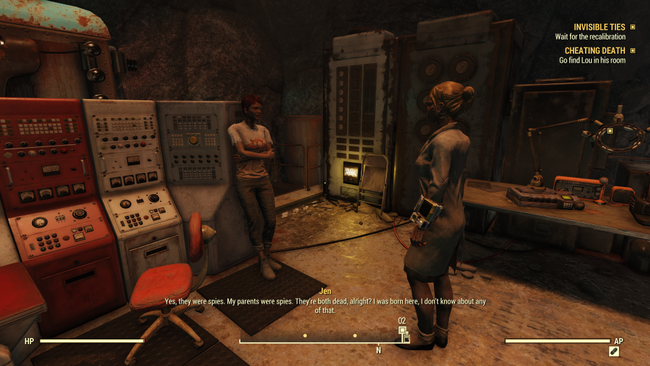
In a vacuum, Wastelanders' premise is a silly one -- people from outside Appalachia have begun to return to the region in the hopes of striking it rich. Rumors of a sealed-away treasure have cropped up in the area and thus, people have shown up to try to place their stake in vying for the prize. You see, Fallout 76 originally launched without any NPCs at all, a decision that sits at the heart of a series of design philosophies that kneecapped Fallout 76 from the outset. To talk about NPCs so matter-of-fact-ly is admittedly awkward, but it's the position that Fallout 76 and Wastelanders have put us in.
One of my major criticisms of Fallout 76 initially had very little to do with performance, or the engine, or bugs, but rather in design. By populating the world with -- outside of a few robots -- only holotapes and notes from the dead, this meant that so many aspects of exploring Appalachia ended up feeling dull and frankly meaningless. Expecting players to pick up the slack is utopian in premise but was doomed to fail in execution. There were nuggets of emergent storytelling to be had with the occasional memorable run-in with a fellow player, but these moments were few and far between, outweighed entirely by the loss of the level of interaction with the world that only a bespoke narrative could provide.
Nearly every quest-backed storyline in the original version of the game followed the general template of finding a note or a location, familiarizing yourself with what had happened before & during the bombings, and then moving on without much of any attachment, making sure to loot whatever doodad you earned from ridding the place from super mutants, scorched, ghouls, or whomever. It was a gameplay progression that wore down fast for all but the most dedicated of player. As a pure gameplay system, this was equally boring, diluting down the RPG experience down to mostly killing, looting, and repeating. It was in these aspects where I hoped Wastelanders could provide a marked improvement.
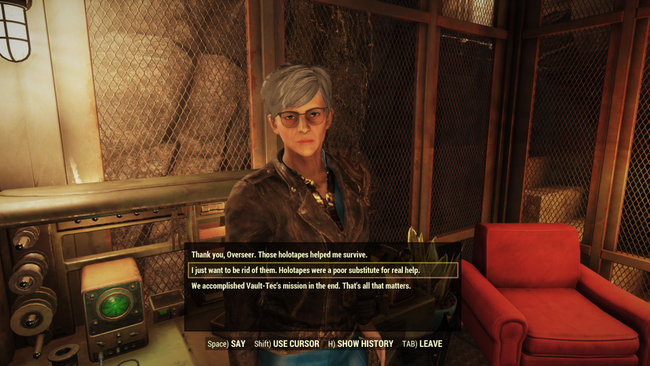
Wastelanders isn't the typical sort of add-on than the idea of an expansion might normally convey. Even players who are new to Fallout 76 will immediately come across the new additions as soon as they leave the starting vault. Some of the earliest interactions with NPCs will immediately begin to lay out the premise of the game, introduce the ideas of crafting and gathering, and all together serve as a bolstered onboarding experience for new players. It comes at the cost of being a bit incongruent for those that have already sunk dozens of hours into the game -- being told how to craft a basic sign when your decked out supercamp betrays a clear level of competence, but I think it'll be a better introduction long-term.
Characters old and new will also now have traditional dialogue trees which were, of course, absent from the original launch, including skill checks that involve your SPECIAL stats. There's nothing new here to be overly excited about, but it's pleasing to see them return in some form none-the-less since Fallout 76 and even Fallout 4 had side-stepped the classic implementation entirely. One interesting little twist here is that since 76 is a persistent online world, you can't create a hard save before a dialogue choice to reload for the 'best' outcome, you have to roll with what you get (though you can sometimes back out of a dialogue to boost your Charisma or other stats with consumables).
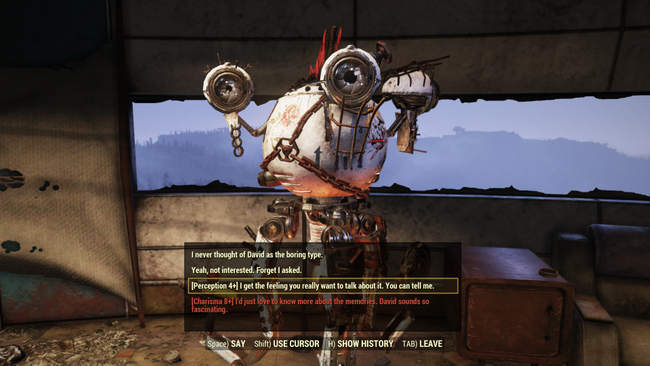
Unfortunately, this means that none of the choices ever feel too meaningful. I'm not sure if the designers weren't confident enough to make lasting consequences for failing skill checks, or didn't want to inconvenience players to some extent, but the implementation almost feels as though it was a back-of-the-box requirement, and it doesn't feel truly realized in a meaningful way. There will usually be a simple comment that you can provide if you meet a certain requirement, but I never felt truly disadvantaged to even a minor degree if I wasn't able to select a certain option. Without being able to reload and examine the extent of the different choices, it became a difficult thing to fully judge. But whenever I wasn't able to select a specific dialogue choice, I felt like the safety net was never far behind. For instance, if I didn't have a high enough Intelligence stat to comment on a technical detail in a given situation, usually that same detail would just be parroted back at me later in the dialogue.
There is one small benefit in that with the new system in play, suddenly drug items like Berry and Grape Mentats --which boost your Intelligence and Charisma respectively -- now have multiple applicable uses. While the passive vendor bonuses of Charisma, for example, might have not been worth micromanaging before this point, now there are multiple reasons to keep a varied stash of chems and alcohol on hand to use before talking to any given character. If Bethesda were to go a little harder at making meaningful dialogue trees, this marrying of the old system with the new is promising going forward.
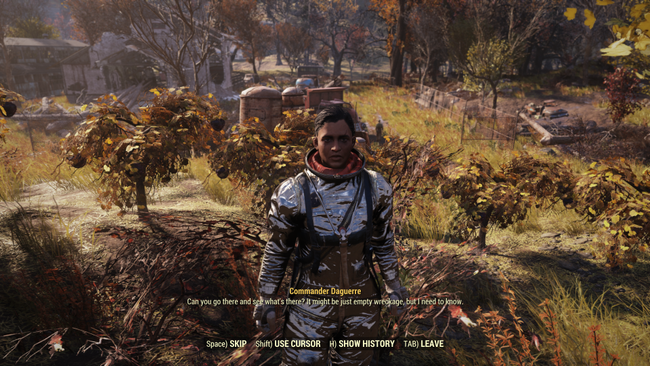
The characters themselves that have been introduced in Wastelanders are a mixed bag. Unfortunately, the bottom of the pile is a pair of 'Allies' who have the option of joining you at your camp once you've met them. Upon becoming acquainted, these characters will then ask the player to go to a specific region of the world, retrieve an item or defeat a marked enemy, and then return and repeat.
They will ask you to do this over, and over, and over, and over again.
It's here where I feel Wastelanders most obviously squanders away most of its potential. By adding these characters and reducing them to simply a starting line for over a dozen fetch quests that have the same bland, unimaginative design as the base game, it comes across as though the root issue that often made the quests of the original game so incredibly boring remained completely unaddressed. The characters are well voiced and their specific story arcs are fine, but the shoddy implementation absolutely compromises the intent. The fact that I had to turn down romantic advances at the end despite avoiding the flirtatious line at every turn is just the icing on the cake for showcasing how stapled-on this particular aspect of Wastelanders feels.
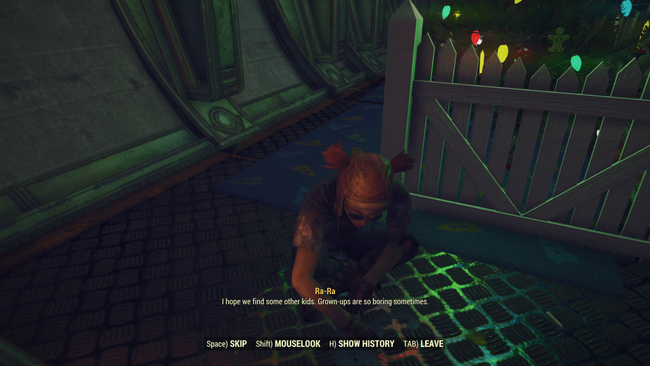
At the top of the list are a few silver linings, however. When interacting with the new Settler or Raider factions that have seated themselves in specific regions of the world, you'll come across a variety of new characters that are admittedly a joy to engage with. The Raiders, specifically, have a smattering of unique personalities that I found myself genuinely enthusiastic about. A super mutant named Gail acting as an adoptive mother for a young human child named Ra-Ra and a charismatic charmer named Johnny are fun enough on their own, but the highlight has to be a crass woman named Weasel, a raider who's lost the ability to speak and must now communicate through a voiced collar (think of Dug in Pixar's Up).
The collar, however, doesn't allow Weasel to swear at all (which she's naturally predisposed to) and often mistakenly mistranslates some of her intended word choices. It all makes for a fun interaction that was a highlight of the expansion. The fact that Weasel tags along for a specific story quest to provide some interaction and even assist in combat is also a highlight -- it's the closest Fallout 76 has ever felt to any of Bethesda's previous work in the series. The Settler faction also has some strong character work with Jen, the daughter of a Chinese immigrant who feels as though she must constantly prove herself in an environment where many sneer at her heritage.
It was in these interactions where I could see just a glimpse of the potential Fallout 76 has if it manages to effectively use Wastelanders as a clear foundation for the future.
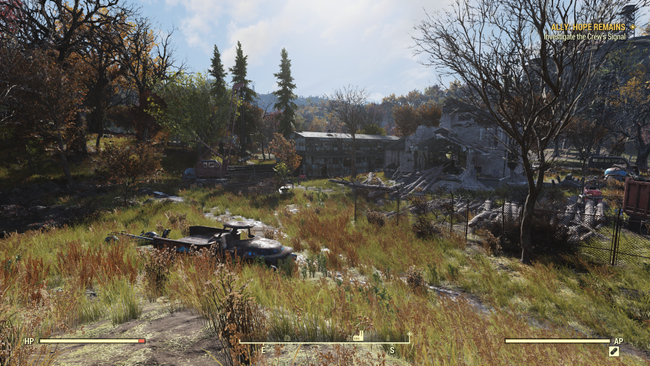
On a more technical level, Wastelanders also introduces a new lighting system, along with the usual bevy of performance improvements. In certain narrow snippets, the improvement is obvious, with the autumnal woodlands providing an almost picturesque background in specific conditions or at specific times of day. The overall package is still incredibly uneven though, with an overreliance on bloom and godrays, dated character models and often woeful animations to immediately counteract any moment when I would momentarily think that the game actually looks alright.
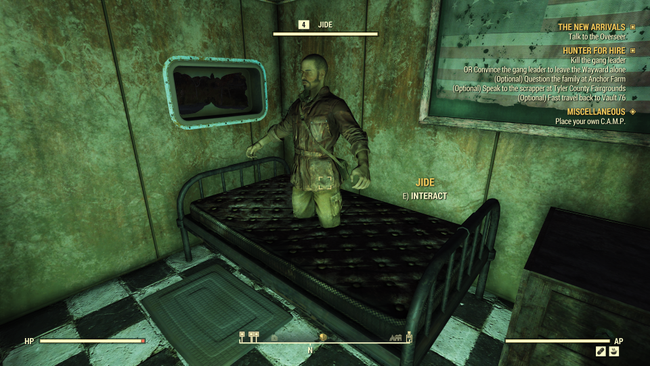
Last but not least, Fallout 76 is still Fallout 76, though a slightly improved version of its 2018 self. Character models will still sleep standing up, t-pose inside of other equipment, and clip through the environment. Some enemy models will still ice-skate across the ground, remain entirely invisible, or teleport around the area. One of the first quests I undertook in Wastelanders involved fighting a deathclaw, which floated in the air as its character model collided with nearby trees. It's unfortunate that the result isn't more polished because I can just start to see a roadmap for the future starting to take place, if only just barely.
Wastelanders won't convince anyone who thought Fallout 76 was irredeemable to begin to believe otherwise, it's simply not enough of a marked improvement to wholesale change many people's minds. For those that left a sliver of a chance for redemption, however, it's one small, wobbly step in the right direction.